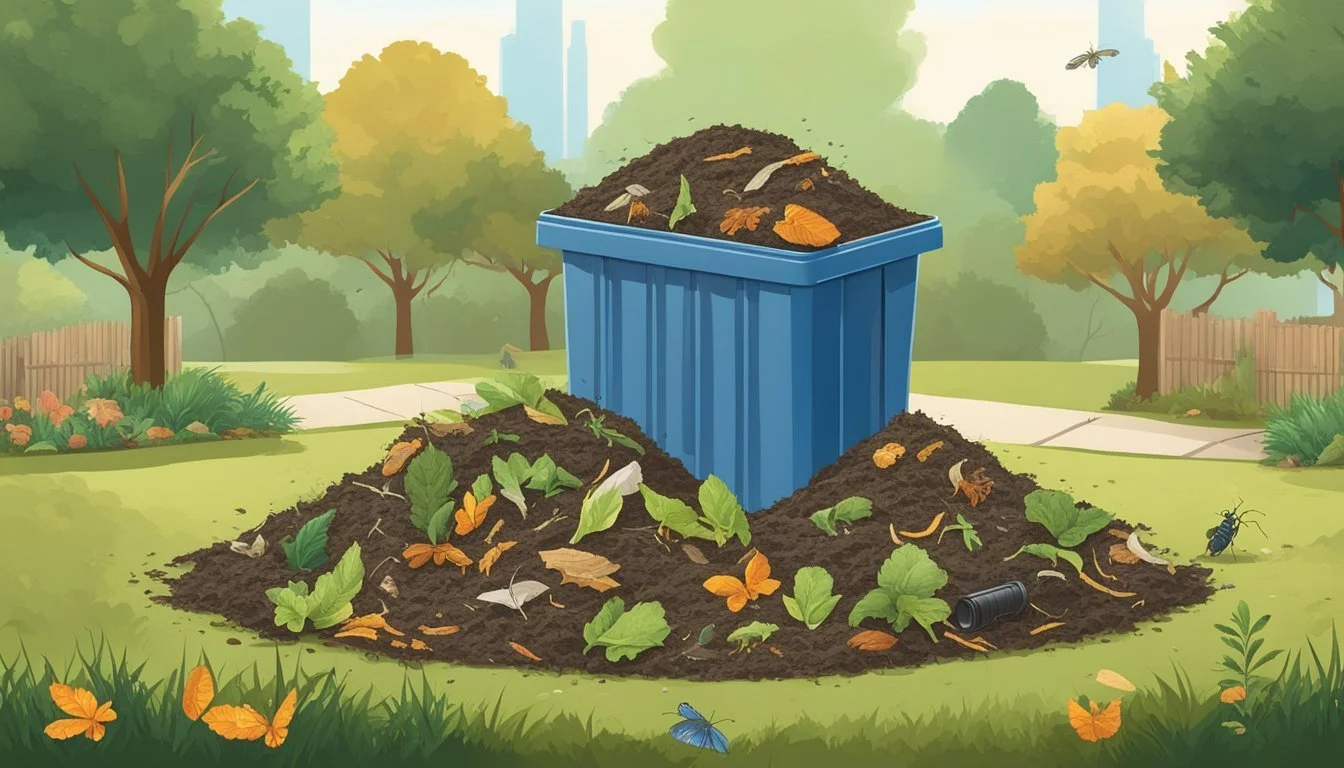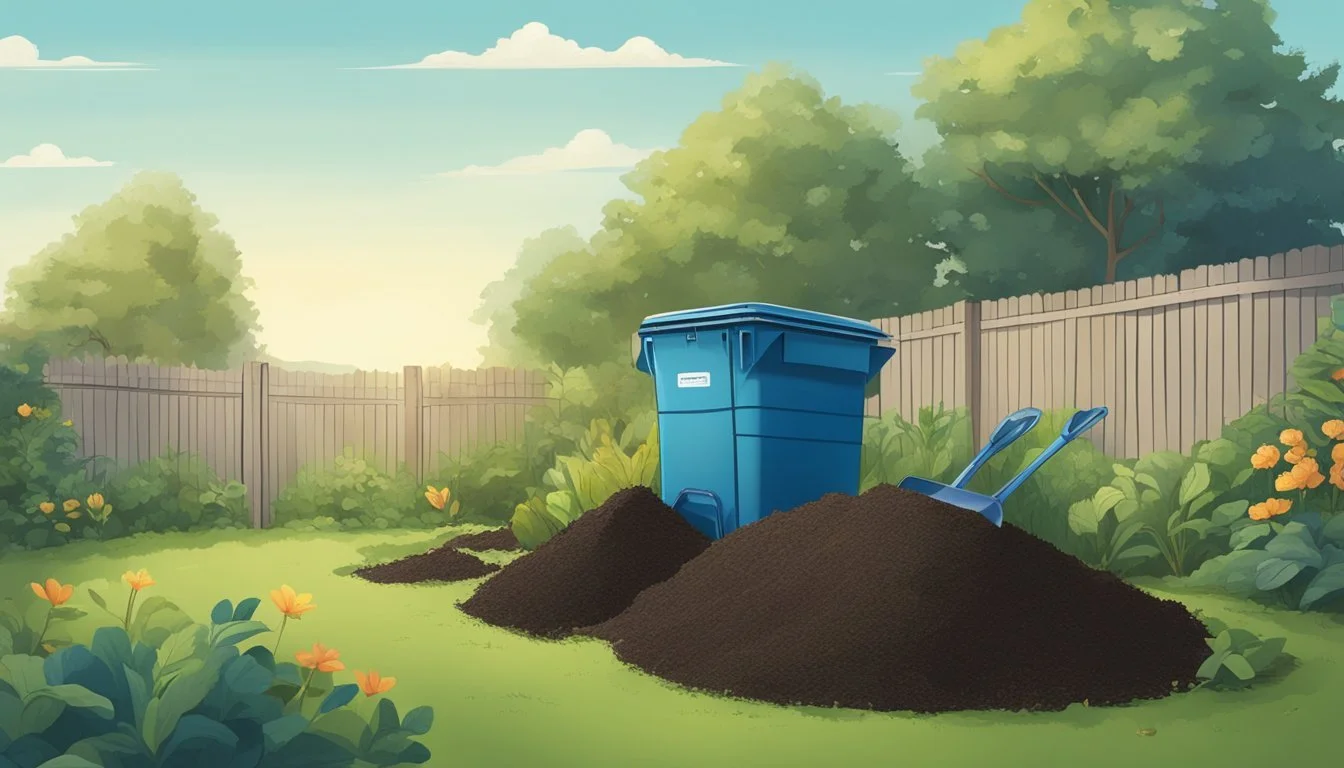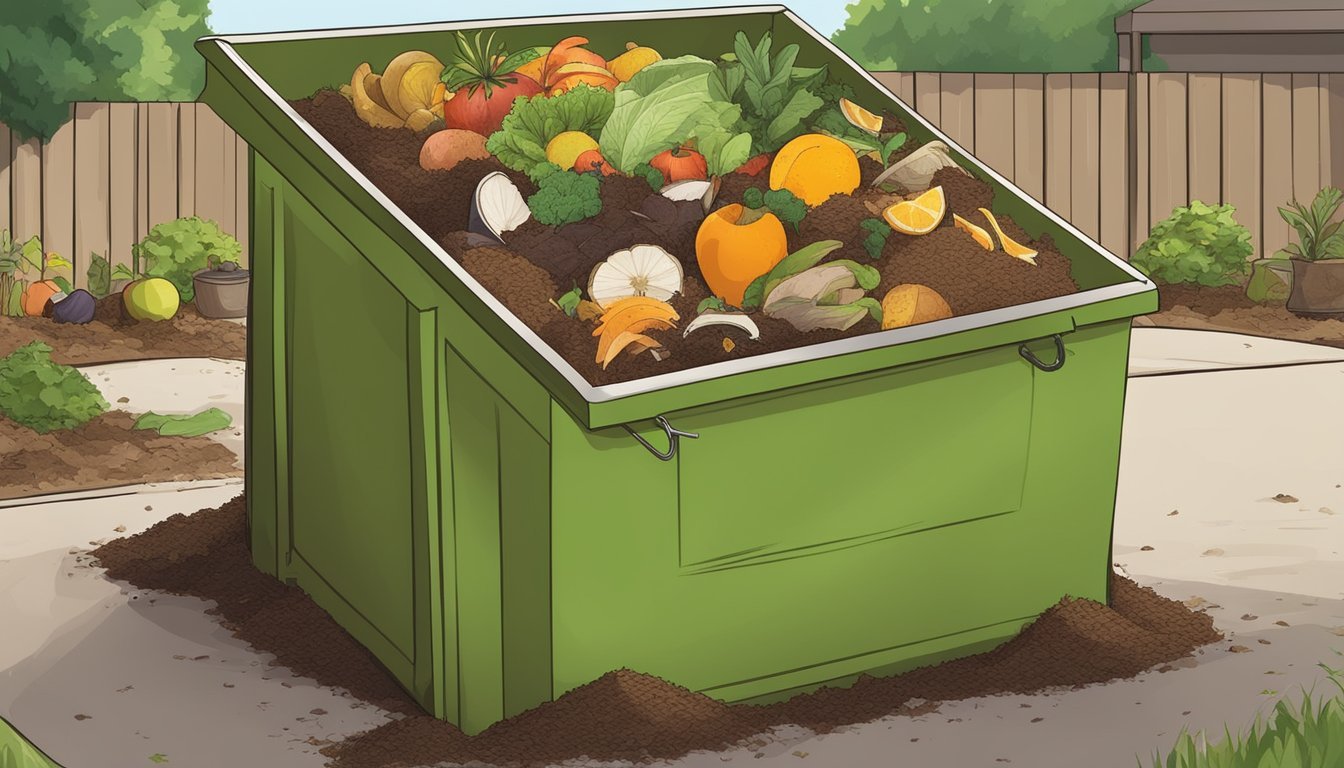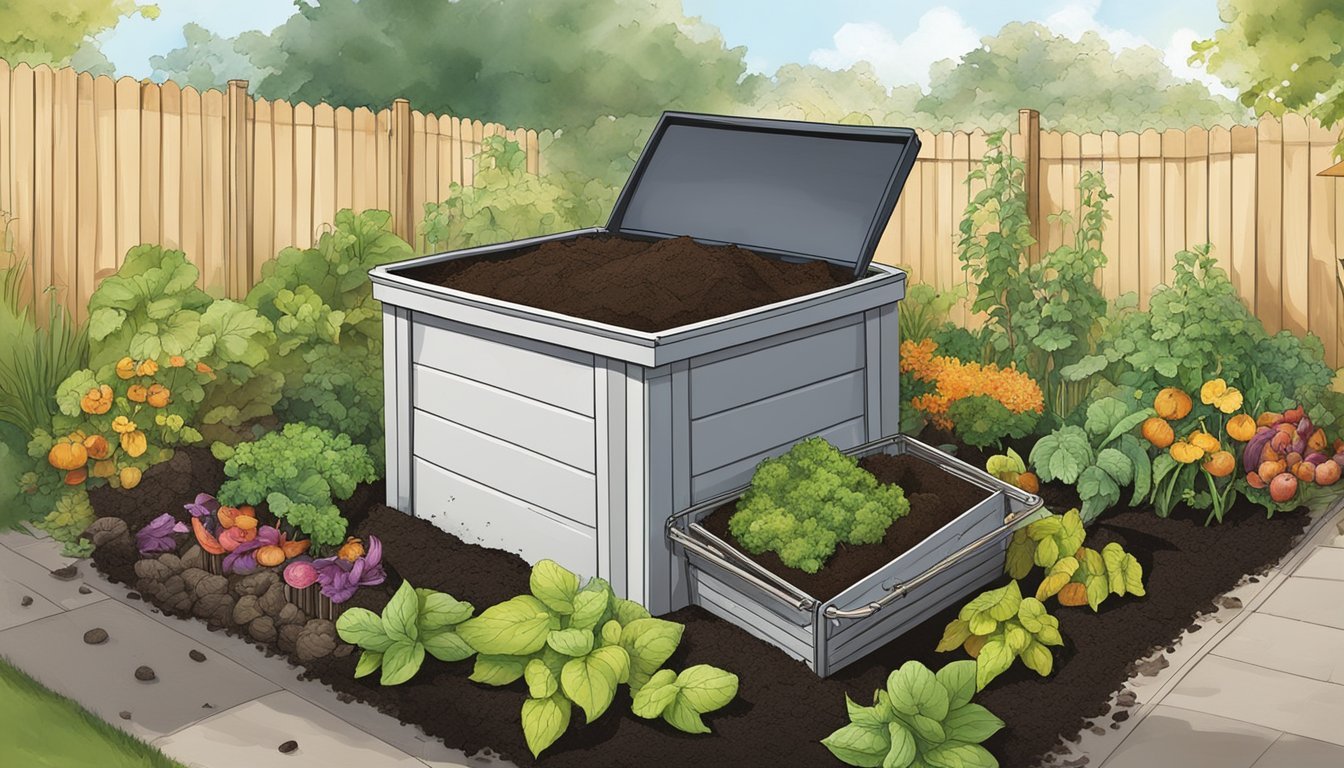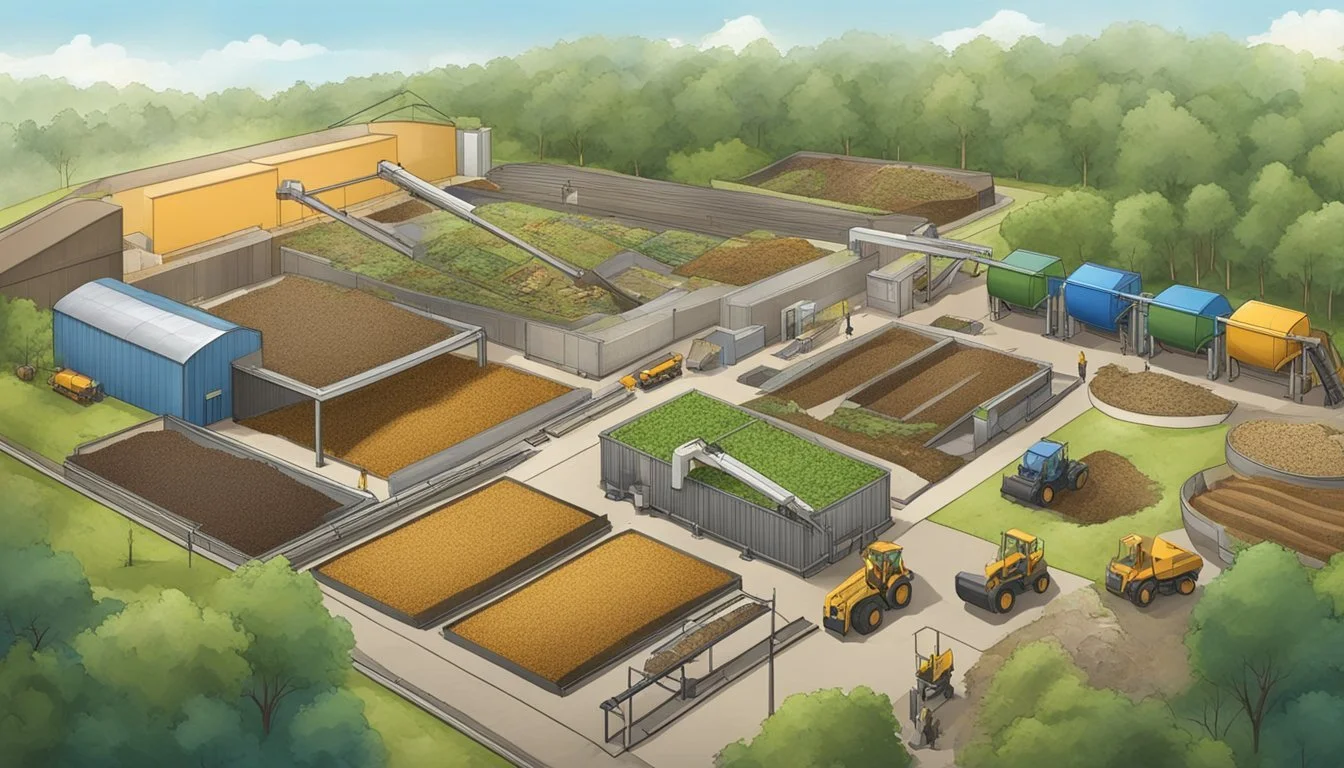Guide to Composting in Conroe, TX
Essential Tips for Sustainable Waste Reduction
Composting is an increasingly popular practice among environmentally-conscious individuals and communities, and Conroe, Texas, is no exception. As residents of Conroe look to reduce their environmental impact and enrich their gardens, understanding the local avenues for composting becomes crucial. Compost, by its nature, offers a wealth of benefits, including the improvement of soil structure, the enhancement of nutrient content, and the promotion of better plant growth.
In Conroe, opportunities for composting are supported by the collaboration between public services and private entities. The city's initiatives, such as partnerships with New Earth Compost, reflect a commitment to environmental stewardship by transforming organic waste into valuable compost. With the proper balance of organic matter, moisture, oxygen, and bacteria, the composting process efficiently converts yard trimmings and food scraps into a resource that supports plant life and contributes to the health of the ecosystem.
For residents who wish to start composting at home or contribute to community composting programs, Conroe presents a variety of resources. Educational programs and services provide guidance on the essentials of composting—from the selection of appropriate organic matter like fruits and vegetables to understanding the crucial role of bacteria and aeration in the process. With this knowledge, the community of Conroe is well-equipped to adopt composting practices that benefit the environment and enhance the natural beauty of Texas landscapes.
Benefits of Composting
Composting in Conroe, TX offers substantial advantages for enriching soil and converting waste into beneficial resources.
Soil Health Enhancement
Composting creates a rich soil amendment, boosting soil health and fertility. By adding compost to the earth, gardeners and farmers improve soil structure, which enhances root growth and water retention. Compost introduces beneficial microorganisms and vital nutrients into the soil that plants need to thrive. For example, Texas A&M AgriLife Extension Service outlines the process of transforming leaves, kitchen scraps, and other natural material into a nutrient-dense solution that enriches the earth.
Waste Reduction and Recycling
Composting serves as a key element in achieving a zero waste goal by recycling organic matter back into the ecosystem. Food waste and other organic materials, which would otherwise contribute to ever-growing landfills, are transformed into valuable compost. This process not only reduces the amount of trash but also lessens methane emissions from landfills. Organizations like Take Care of Texas highlight how composting promotes waste reduction and environmental stewardship, turning what would be organic waste into a resource for improving landscapes and gardens.
Basic Composting Principles
Composting in Conroe, TX, transforms organic materials into a nutrient-rich soil conditioner through natural processes. This section details the various components needed and explains the scientific process behind the decomposition of organic matter.
Composting Components
Organic Matter: Essential elements of a compost pile include leaves, grass clippings, kitchen scraps, and other plant-based materials. These provide carbon and nitrogen, two crucial nutrients for composting.
Water: Moisture is vital for composting, helping to break down organic matter. The pile should be damp but not soaked, as excess water can hinder aeration and slow the decomposition process.
Air: Oxygen aids in the breakdown of organic matter by soil microbes and bacteria. A well-aerated compost pile promotes efficient decomposition.
Balance of Components:
Component Function Ideal Ratio Browns (Carbon-rich materials) Provide energy for microbes 3 parts Greens (Nitrogen-rich materials) Build the cell structure of new organisms 1 part Water Maintains moisture level Enough to be damp Air Necessary for microbial respiration Regular turning
Decomposition Process
Stage 1: Initial Breakdown: Bacteria begin to decompose the organic materials, with the pile heating up as a result. During this phase, the pile should be turned frequently to incorporate oxygen and distribute moisture.
Stage 2: Cooling and Maturation: Once the high temperature peak has been reached, the pile cools down, allowing different species of bacteria and soil microbes to take over. This phase is critical as it further breaks down complex organic materials into finer particles.
The materials in a well-managed compost pile will decompose over time, turning into compost that can enhance soil structure and fertility. Regular observation and maintenance ensure the process runs smoothly, resulting in a beneficial amendment for gardens and landscapes in Conroe, TX.
Setting Up a Compost System
Setting up an effective compost system is an integral step for Conroe, TX homeowners interested in recycling organic waste. Important factors to consider include the location, type of bin, and the balance of materials for optimal decomposition.
Choosing the Right Location
Selecting an ideal spot for a compost system is crucial. The location should offer balance between sun and shade to maintain a consistent temperature that aids the composting process. It should also be conveniently accessible for adding food scraps, leaves, and grass clippings while ensuring it's not too close to living areas to avoid any potential odors. Adequate drainage is essential to prevent waterlogging, and a flat space allows for easier aeration and management.
Selecting a Composting Bin
The compost bin is the cornerstone of the system, providing a space where organic material can decompose. Homeowners can either build or buy a bin suitable for their needs. A bin with proper aeration allows oxygen to circulate, supporting the aerobic microbes responsible for breaking down the material. The size of the bin will depend on the amount of organic waste produced. For instance, a typical household may opt for a bin that can accommodate periodic addition of kitchen food scraps and yard waste, like leaves and grass clippings. Bins should also have a method to retain moisture, as a dry compost pile will slow down the microbial activity. Some Conroe community members have had success using three-bin compost systems for efficient space usage and management.
For individuals looking for more detailed insights into local composting methods, the Texas AgriLife Extension Office offers additional guidance on suitable practices, emphasizing the importance of composting for improving soil health in municipal and community gardens.
Compost Materials and Maintenance
Composting in Conroe, TX, involves selecting the right mix of organic waste to maintain a balanced composting process. Effective aeration and moisture control, along with the choice of materials, are crucial.
Acceptable Composting Materials
Leaves, vegetable scraps, food scraps, and grass clippings serve as excellent materials for compost. These items provide the necessary carbon and nitrogen to feed the microbes that break down the organic matter. It's essential to maintain proper aeration and water levels to foster the right environment for these microscopic decomposers.
Greens (high in nitrogen)
Vegetable scraps
Fruit waste
Grass clippings
Coffee grounds
Browns (high in carbon)
Dry leaves
Straw or hay
Shredded newspaper
Sawdust from untreated wood
Composting Do's and Don'ts
Do ensure that compost receives enough water to stay moist but not waterlogged, aiding the microbes in breaking down the organic waste effectively.
Do: Turn the compost pile regularly to provide oxygen that microbes need to thrive.
Do: Chop or shred larger items to speed up the composting process.
Don't add meat or dairy to compost as they can cause odors and attract pests. It's also important to avoid materials treated with chemicals or pesticides, which can be harmful to the composting system and the environment.
Don't: Include diseased plants or invasive weeds that can spread through compost.
Don't: Overwater the compost pile, which can suffocate microbes and slow down composting.
Advanced Composting Techniques
In Conroe, TX, composting enthusiasts can elevate their composting practice through a variety of advanced techniques. These methods enhance decomposition rates and nutrient profiles, making compost even more beneficial for garden soil.
Vermicomposting Essentials
Vermicomposting harnesses the natural digestion process of worms to decompose organic matter more efficiently than traditional methods. Red worms or red wigglers work best, as they thrived in the Conroe compost environment. Essentials for vermicomposting include a well-ventilated bin, pH monitoring to maintain a neutral environment, and a mix of green and brown organic matter to ensure a balanced diet for the worms.
Troubleshooting Common Issues
Even with the best practices, issues can arise in composting. Key signs of trouble include bad odors, which often indicate improper aeration or pH imbalance, and slow decomposition, which could mean a lack of essential bacteria or soil microbes. Regular turning can introduce air and distribute microbes throughout the compost, while adding crushed eggshells or lime can help neutralize acidic conditions.
Enhancing Compost Quality
The final quality of compost depends on the balance of organic matter, nutrients, and soil microbes. To enhance the quality of the compost, one should:
Add diversity: Incorporate a variety of organic materials to supply a wide range of nutrients.
Monitor moisture: Compost should be damp but not waterlogged to support microbial activity.
Understand C ratio: Maintain a carbon to nitrogen ratio between 25:1 and 30:1 for optimal decomposition.
Through these advanced composting techniques, one can significantly improve the fertility and structure of their soil in Conroe, TX.
Composting in Conroe and Beyond
As urban and suburban growth continues, Conroe, TX, and surrounding areas have embraced composting, transforming organic waste into valuable soil amendments for landscaping and gardening. Here, composting is more than just a practice; it's part of a community-focused movement towards sustainability.
Composting in the Conroe Community
In Conroe, residents access New Earth Compost services, which transform yard trimmings, food scraps, and other organic materials into quality compost. They cater to individual households and large-scale contractors requiring multiple cubic yards of product. For those with smaller needs, such as a single pallet, service is equally attentive. While there is a fee for compost services, the investment supports soil health and reduces landfill usage. The community effort extends to educational support, helping citizens understand the value of compost in enriching local soil.
Municipalities in the area, including Conroe, Houston, and The Woodlands, recognize the environmental benefits of composting. They often collaborate with organizations like New Earth Compost, working towards a greener Texas. Local community gardens often use compost to increase their cation exchange capacity (CEC), making it easier for plants to absorb essential nutrients.
Regional Composting Resources
Beyond the Conroe community, several regional composting resources support both residents and contractors. These facilities often provide bulk compost, mulch, topsoil, and custom soil blends, catering to the diverse needs of the rapidly growing region. For example, Houston-based facilities contribute to the broader efforts in Texas to minimize organic waste and enrich soils statewide.
On a regional scale, partnerships between composting companies and municipalities aim to extend the sustainable management of organic waste to a wider audience. Educational outreach continues to be a priority, teaching residents about composting benefits and best practices, thereby weaving composting into the cultural fabric of Texas communities.
Environmental Impact and Future Outlook
Composting in Conroe, TX, has been instrumental in enhancing soil health and reducing wastage. This section explores its beneficial effects on local ecosystems and recognition as a keystone for sustainable living.
Impact on Local Ecosystems
In the city of Conroe, composting initiatives have had a significant positive impact on local ecosystems. By converting organic matter into nutrient-rich soil, composting not only enriches the earth but also supports the growth of plants in gardens and farms. This practice helps maintain the balance of nutrients in the soil, leading to healthier plant life and increased biodiversity. Furthermore, strategic composting can help mitigate the effects of erosion and runoff, protecting local waterways and preserving the quality of both soil and water for future generations.
Composting as a Sustainable Practice
Adopting composting as a zero waste solution plays a crucial role in Conroe's sustainable practices. It reduces the amount of organic waste sent to landfills, thereby lowering methane emissions and shrinking the community's carbon footprint. As a cyclical process, composting represents a sustainable loop, from farm to table and back to the farm in the form of compost. This method aligns with the zero waste philosophy by treating waste as a resource rather than refuse. As it gains momentum, composting stands as a viable solution for waste management, reflecting the community's commitment to a sustainable future.
Frequently Asked Questions
When venturing into composting within Conroe, Texas, residents often seek clarity on specific conditions affecting their efforts. Conroe's distinct subtropical climate and the importance of managing pests are top considerations that influence the composting process.
Composting in Different Climates
Composting in Conroe, with its humid subtropical climate, demands attention to water and aeration. Adequate moisture is essential for the survival of soil microbes that break down organic material; however, too much water can lead to anaerobic conditions and unpleasant odors. To maintain a balanced compost, individuals should ensure their bins provide proper drainage and are turned regularly to allow airflow and promote even decomposition.
Composting and Pest Control
Pest control is a critical factor in safeguarding compost bins in Texas. The use of tightly sealed containers or bins with secure lids can prevent common pests such as rodents and insects from invading the compost. It is recommended to routinely inspect and secure compost bins, complemented by proper composting practices, such as burying food scraps within the pile, to reduce attractants.


